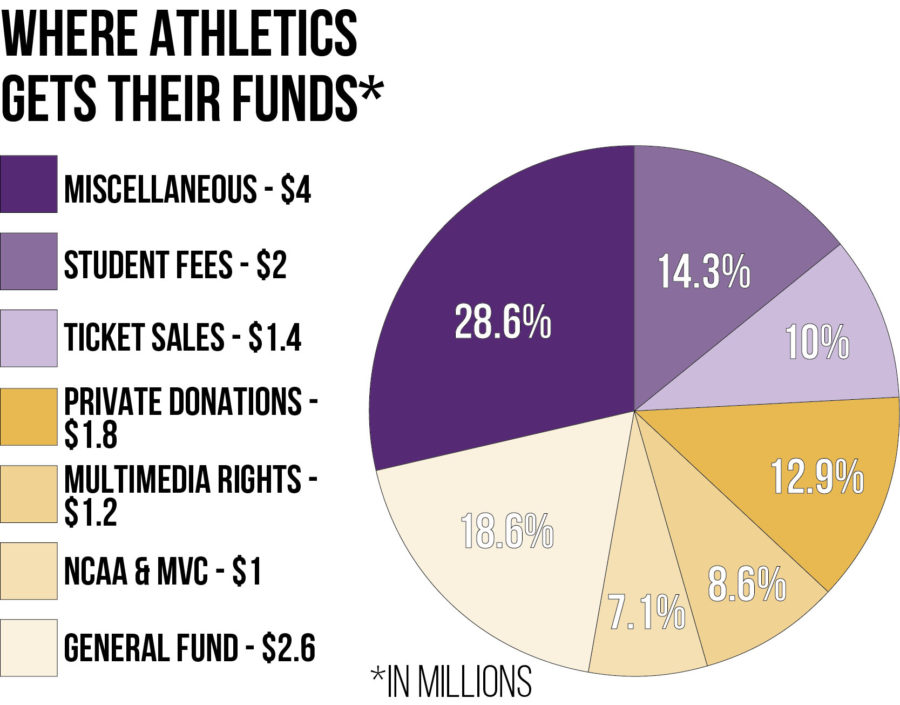AD details budget amid criticism
Oct 20, 2016
David Harris, UNI athletic director, recently gave a presentation to the faculty senate about the various sources for the athletic department’s funding. Harris will be speaking to Northern Iowa Student Governent (NISG) at their upcoming Oct. 26 meeting at 8 p.m.
Harris explained that the premise of the presentation was to discuss academics and finance and their relationship to the athletics department. The presentation was given with the faculty athletics representative Elaine Eshbaugh and associate athletic director of business and finance Bethany West.
“Dr. Eshbaugh presented some information looking at graduation rates, grade point averages and just the academic performance of student athletes versus the student body,” Harris said. “Beth had her portion of the presentation in which she talked about the finances […] and we spent the rest of the time going through that information.”
According to Harris, although this information was not requested, they wanted to allow the faculty the opportunity to ask questions about the academic success of student athletes.
“The three of us basically came together and said it would be a good opportunity for all of us, proactively, to go in and present this information,” Harris said.
Harris said they decided to focus on explaining revenues and expenses and looking at general education funding and student fees, which the athletic department reportedly gets the most questions about.
On Oct. 6 the Northern Iowan (NI) reported on the distribution of student fees between athletics, student organizations, Panther Shuttle, night ride and student activities. The NI reported that 60.7 percent of student fees per student were allocated to the athletic department, while 8.9 percent was allocated to NISG for student organizations and 30.1 percent was allocated to the Panther Shuttle and night ride and student activities such as CAB and the GBPAC.
Student fees allocated to the athletic department total around $2 million of their reported $14 million total budget. Other sources of revenue include ticket sales ($1.4 million), private donations, ($1.8 million), multimedia rights contract, ($1.2 million), distributions from the NCAA and Missouri Valley Conference, ($1 million), general education funding from the state ($2.6 million) and other miscellaneous sources of revenue, according to Harris.
“Then you look at the expense side – generally about 45 percent of our expense budget is caught up in salaries and fringe benefits for the people that work in the department,” Harris said. “And that’s around six million dollars.” Harris continued, saying that around $3.9 million is distributed in student aid in the form of scholarships and that another $1.5 million is expended for travel.
Harris said the athletic budget is a complex system of funds coming in and out, some of which the athletic department cannot definitively decide. According to Harris, around 55 percent of the athletic budget is generated by the athletic department and the other 45 percent comes from the general education fund or student fees.
Harris explained that the multimedia contract, for example, is negotiated between the athletic department and Learfield Sports.
“Learfield makes decisions about how much they believe a certain property is worth,” Harris said. “What most people need to understand is that we […] don’t control that.”
Some students have expressed concern over how much student fees are being allocated towards athletics.
“I think that [athletics] are a big deal,” said pre-masters of accounting graduate student Brandon Richardson. “But at the same time, you go to school to get an education; so I think [athletics] should be big, but not the main focus.”
Callie Sauer, a senior public relations major, said that while she agreed that education should be the primary focus of a university, athletics programs can offer academic opportunities.
“I had [an] internship through the athletics program,” Sauer said. “So it has helped me [academically], because I basically had an athletic marketing internship.”
Jamison Whiting, a junior philosophy and political science major, plays for UNI’s football team as a defensive back. According to Whiting, athletics is not the sole identity of a university, but it is a key part.
“Athletics, academics and the arts […] all help the university maintain its image,” Whiting said. “Without any [one] of those things, that image starts to slide away.”
Whiting went on to say that athletics has been one of the most beneficial parts of the university experience for him and for fellow student athletes, explaining that skills like time management are taught to student athletes. Whiting said student athletes are required, as freshmen, to have a tutor or attend a study group weekly. According to Whiting, these provisions help ensure the academic success of student athletes and the competitive success of UNI athletics.
Harris said that factors like winning games and having an attractive program can impact outside funding for athletics, but many factors still remain outside the control of the athletics department.
“We are committed to having a great relationship with campus,” Harris said, citing a quote that appeared in a previous article in the NI.
Harris said the campus and the community do many things to benefit the athletics program and that they want to do things of equal benefit for the campus and the community.










